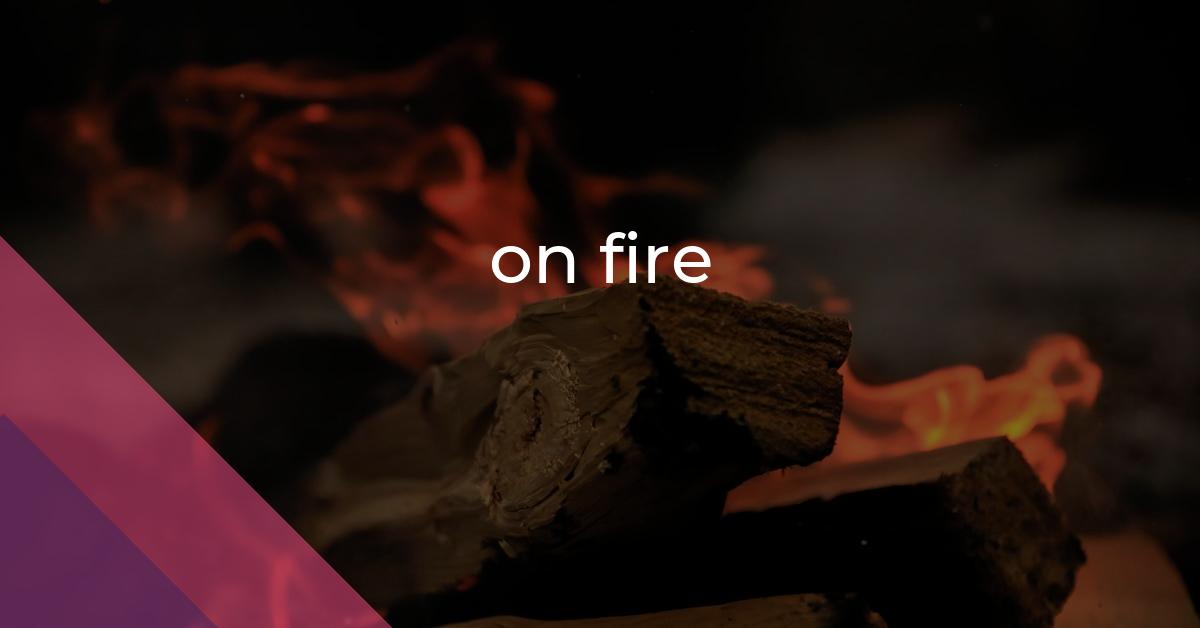on fire: Idiom Meaning and Origin
What does ‘on fire’ mean?
The idiom "on fire" means to be performing exceptionally well or having great success in a particular activity. It is often used to describe someone who is highly skilled, talented, or in a state of intense enthusiasm or energy.

Idiom Explorer
The idiom "set the world on fire" means to achieve great success and recognition, usually in a remarkable or impressive way.
The idiom "piping hot" means something that is extremely hot or freshly cooked. It is used to describe something that is at its highest temperature or in its optimal condition.
The idiom "open fire" means to start shooting or attacking someone with firearms or weapons.
The idiom "on its merits" means to evaluate something based solely on its qualities or performance, without considering any other factors or biases.
The idiom "on hand" means to be available or accessible in the present moment or in a particular place.
The idiom "on good terms" means to have a positive or friendly relationship with someone or to be in a state of mutual agreement.
The idiom "one's socks off" means to do something with great enthusiasm, energy, or skill. It emphasizes the intensity and impressive nature of the action or performance.
The idiom "on end" means continuously or without interruption.
The idiom "on edge" means feeling nervous, anxious, or tense. It implies a state of unease or being easily startled, as if standing on the edge of something uncertain or dangerous.
The idiom "on demand" means something that is available or provided immediately when requested or desired.
The Fiery Origins
When someone is "on fire," they are operating at their highest capacity and excelling in their chosen field or activity. This idiom is often used to describe individuals, teams, or objects that are performing exceptionally well and achieving exceptional results.
The phrase "on fire" can be traced back to our innate fascination with fire itself. Fire has always represented both danger and power, and its captivating qualities have inspired countless myths and legends throughout history. By using the idiom "on fire," we tap into this symbolism to convey a sense of exceptionalism and extraordinary performance.
Using "on fire" literally refers to something being engulfed in flames or burning. It is a simple connection to the concept of combustion. For example, we might describe a building that is set ablaze as being "on fire," highlighting the immediate danger and urgency of the situation.
Figuratively, "on fire" is typically used to describe a person's exceptional energy, skill, or passion in a specific endeavor. It denotes a level of intensity and activity that often leads to positive outcomes. This idiom can be applied to individuals, teams, or even objects that are excelling and performing at a remarkable level. For instance, a sports team that is dominating their opponents and exhibiting remarkable skill may be described as being "on fire."
Another related idiom is "fire on all cylinders." This phrase suggests someone or something is operating at full capacity, with all its parts functioning at their best. It is often used to describe individuals or teams that are firing on all cylinders and achieving outstanding results. Imagine a well-oiled machine running smoothly and efficiently, with every part contributing to its overall success.
Similarly, the term "catch fire" refers to something suddenly gaining popularity or becoming successful. It signifies a rapid rise in popularity or recognition, capturing the attention of a larger audience. This idiom is often used in the context of creative works, such as books, movies, or songs, that quickly gain widespread acclaim and attract a devoted fan base.
Next, we have the expression "ball of fire," which is used to describe someone who is full of energy, enthusiasm, and determination. This idiom conveys a sense of unstoppable momentum and relentless drive. It can be applied to individuals who are making significant progress in their careers or to teams that are achieving extraordinary results through sheer dedication and hard work.
Another related phrase is "set the world on fire." This idiom implies someone or something that is capable of creating a profound impact and leaving a lasting impression on the world. It suggests the ability to generate immense excitement, admiration, and influence. It is often used to describe individuals who are making groundbreaking discoveries, creating innovative works of art, or revolutionizing an industry.
Lastly, we have the expression "hair-on-fire," which is used to describe a state of extreme urgency or panic. This idiom conveys a sense of alarm, as if someone's hair is literally on fire. It is often used humorously to describe situations or individuals who are in a state of high stress or chaos, scrambling to resolve a problem or meet a deadline.
The idiom "on fire" encompasses a range of meanings depending on the context in which it is used. Whether employed literally or figuratively, this phrase denotes exceptionalism, intense activity, and exceptional performance. It draws upon our fascination with fire and taps into the symbolism associated with it. As our cultural contexts evolve, so too may the nuances and applications of this idiom. Its versatility allows for creative interpretation and expression, enabling speakers to convey a sense of intensity or extraordinary achievement within various contexts.
Example usage
Examples of how the idiom "on fire" can be used in a sentence:
- After scoring three goals in the first period, the forward was on fire and led his team to victory.
- The sales team has been on fire this month, exceeding their targets by 50%.
- Her latest book release was so well-received by critics and readers that it quickly became on fire, topping the bestselling charts.
More "Expression" idioms



